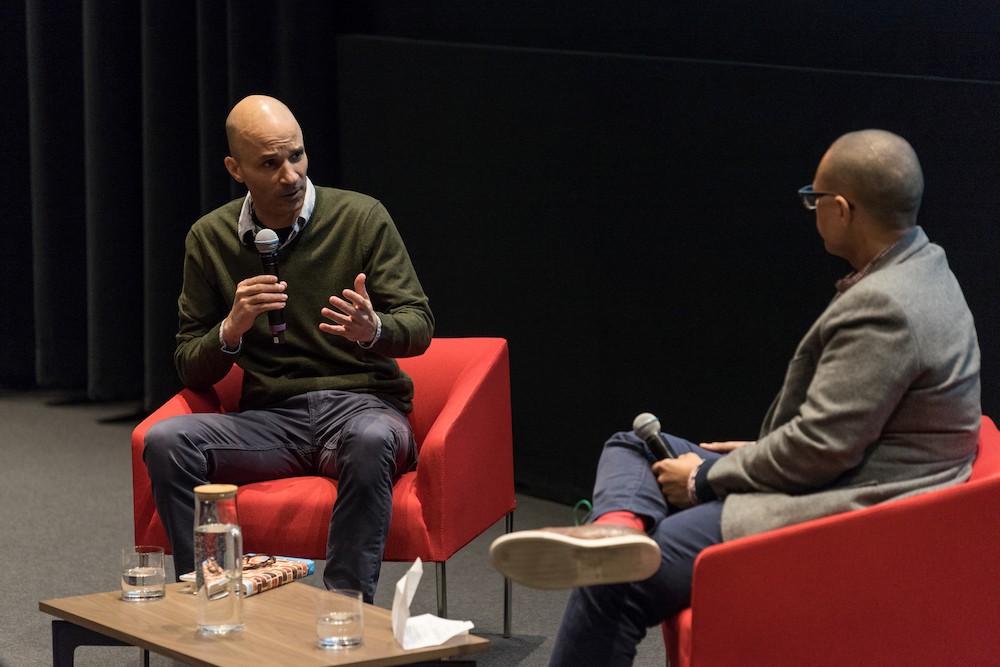Malcolm Hansen ’14 and Professor Victor LaValle ’98 Sit Down to Discuss Writing and the Multiracial Experience
Beyond Black and White: Writing about the Multiracial Experience, organized by Our Word and Columbia Artist/Teachers (CA/T), took place on February 25th, 2020 at the Lenfest Centre for the Arts. The event was part of conversations and dialogues hosted by Our Word and CA/T that aimed to explore how racial identity affects writers and readers. Malcolm Hansen '14 and Professor Victor LaValle '98, both mixed race authors, tackled questions of authenticity and inclusion, and explored what stories look like in the 21st century.
Hansen began by reading excerpts from his book They Come In All Colors, chosen from four different sections of the novel. It won the 2019 First Novelist Award from the Black Caucus of the American Library Association and was nominated for a 2019 NAACP Image Award. The novel follows the story of Huey Fairchild at a fancy all boys prep school in Manhattan. Huey is biracial. The novel is set in two locations, namely, New York and Acresbury, Georgia.
When asked by LaValle about how it all came to be, Hansen said it was a long journey. In its first form, it was seventy pages. “It took a long time to figure out the focus of the story,” said Hansen. It took him seven years from the initial seventy pages to where it came to be. In that time he got married, had kids, and moved from San Francisco to Sweden. “I was about to give up as I was getting nowhere with it and as a last gasp effort, I applied to Columbia.” Hansen says the feedback he received at Columbia really opened things up for him. He credits LaValle’s writing workshop in helping him find the focus of the story and said it worked ‘magnificently.’ Although he wasn’t able to finish the novel in his time at Columbia, he did manage to create a half decent outline during his thesis.
It took him another two years after Columbia to get to the end of the journey and it wasn’t easy. He was on the precipice, about to give up (again), when he was faced with an emotional reckoning. “God is a very mean person,” he said when thinking back on those two years. He was consumed with the panic of delivering on a promise. But he couldn’t and did not give up. “I went all in.” To which Lavalle quipped, “That was a very good journey.” As the audience laughed, Hansed agreed and conceded: “It’s not fun.”
As a mixed race person, he wanted to explore the conventions of race, especially in an American context. “I wanted to see which side of the racial divide to be on through the characters and wanted to explore where that journey was going,” replied Hansen. He also acknowledged the fact that there is a lot of pain and hurt in the world and we as people don’t always see all the different enclaves of it. He set out to write knowing that there are different people in the world while having the sensibility to know that his was not the only story and to find an intersection for these different stories in his writing.
The conversation turned to what a mixed race experience is. LaValle shared how his mother grew up as a majority in her country and so dismissed the black narrative in America, when she came here. He said that growing up in a majority gives you confidence and it took her twenty years to see the experiences of the people. Hansen and LaValle agreed that mixed race narrative is a rich and complex one and new discussions are finally becoming common.
LaValle then opened the floor for questions from the audience. One of the audience members asked Hansen how he kept going in his darkest moments, to which he replied: “I was lost in the mountain but I couldn’t stop. I cursed myself for my desperation.” His journey was full of contradictions and hardships but he didn’t give himself an ‘out.’ He said, “I backed myself into a corner. You need to do that if you want to do something.”
When asked what he wanted people to take away from the novel, Hansen said, “I want to leave it open to the reader.” It was important to him to convey the complexity of the relationships and for their relationships to be rich and real. “I wanted people to see these characters as someone one would see on the street.” He spoke of the need to tell the stories that aren’t told and of wrestling with the legacy of being mixed race. He didn’t want his stories to feel untrue or fake to another mixed race person. But he also emphasized the importance of telling honest stories that speak of universal experiences. He believes that such stories connect us all, irrespective of gender, race, or sexuality, and become irresistible when you cross them.
Click here for more information about the event.
